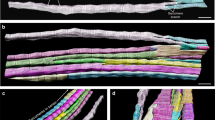Play all audios:

ABSTRACT SOME frog muscles, such as the iliofibularis, contain two types of muscle fibres: the “slow” fibres, with multiple innervations by small nerve fibres and capable of producing a
maintained contracture when depolarized; and the “twitch” fibres which respond normally with a transient contracture and are innervated by larger motor nerve fibres1,2. Contracture
characteristics of these muscle fibres seem to be determined by the type of innervation they receive, because the iliofibularis muscle loses its prolonged contracture after its original
innervation has been replaced by the nerve to the sartorius, which is a purely twitch muscle3. Access through your institution Buy or subscribe This is a preview of subscription content,
access via your institution ACCESS OPTIONS Access through your institution Subscribe to this journal Receive 51 print issues and online access $199.00 per year only $3.90 per issue Learn
more Buy this article * Purchase on SpringerLink * Instant access to full article PDF Buy now Prices may be subject to local taxes which are calculated during checkout ADDITIONAL ACCESS
OPTIONS: * Log in * Learn about institutional subscriptions * Read our FAQs * Contact customer support SIMILAR CONTENT BEING VIEWED BY OTHERS THE UNIFIED MYOFIBRILLAR MATRIX FOR FORCE
GENERATION IN MUSCLE Article Open access 24 July 2020 SPONTANEOUS MYOGENIC FASCICULATION ASSOCIATED WITH THE LENGTHENING OF CARDIAC MUSCLE IN RESPONSE TO STATIC PRELOADING Article Open
access 20 July 2021 THE FORCE OF THE MYOSIN MOTOR SETS COOPERATIVITY IN THIN FILAMENT ACTIVATION OF SKELETAL MUSCLES Article Open access 18 November 2022 REFERENCES * Tasaki, I., and
Mizutani, K., _Jap. J. Med. Sci._, 10, 237 (1944). Google Scholar * Kuffler, S. W., and Vaughan Williams, E. M., _J. Physiol._, 121, 318 (1953). Article CAS PubMed Central Google Scholar
* Miledi, R., and Orkand, P., _Nature_, 209, 717 (1966). Article ADS CAS Google Scholar * Katz, B., and Miledi, R., _J. Physiol._, 147, 10P (1959). Google Scholar * Birks, R., Katz,
B., and Miledi, R., _J. Physiol._, 150, 145 (1960). Article CAS PubMed Central Google Scholar * Buller, A. J., Eccles, J. C., and Eccles, R. M., _J. Physiol._, 150, 417 (1960). Article
CAS PubMed Central Google Scholar * Eccles, J. C., Eccles, R. M., and Kozak, W., _J. Physiol._, 163, 324 (1962). Article CAS PubMed Central Google Scholar * Buller, A. J., and Lewis,
D. M., _J. Physiol._, 178, 343 (1965). Article CAS PubMed Central Google Scholar * Vrbová, G., _J. Physiol._, 185, 17P (1966). Article Google Scholar * Miledi, R., in _The Effect of
Use and Disuse on Neuromuscular Functions_, 35 (Publ. House Czech. Acad. Sci., Prague, 1963). Google Scholar Download references AUTHOR INFORMATION Author notes * R. ELUL: Supported by a
fellowship from the National Sclerosis Society, and by a contract with US Air Force (EOAR). * E. STEFANI: Fellow of the Consejo Nacional de Investigaciones Cientificas Y Técnicas, Argentina.
AUTHORS AND AFFILIATIONS * Department of Biophysics, University College, London R. ELUL, R. MILEDI & E. STEFANI Authors * R. ELUL View author publications You can also search for this
author inPubMed Google Scholar * R. MILEDI View author publications You can also search for this author inPubMed Google Scholar * E. STEFANI View author publications You can also search for
this author inPubMed Google Scholar RIGHTS AND PERMISSIONS Reprints and permissions ABOUT THIS ARTICLE CITE THIS ARTICLE ELUL, R., MILEDI, R. & STEFANI, E. Neurotrophic Control of
Contracture in Slow Muscle Fibres. _Nature_ 217, 1274–1275 (1968). https://doi.org/10.1038/2171274a0 Download citation * Received: 27 February 1968 * Issue Date: 30 March 1968 * DOI:
https://doi.org/10.1038/2171274a0 SHARE THIS ARTICLE Anyone you share the following link with will be able to read this content: Get shareable link Sorry, a shareable link is not currently
available for this article. Copy to clipboard Provided by the Springer Nature SharedIt content-sharing initiative
